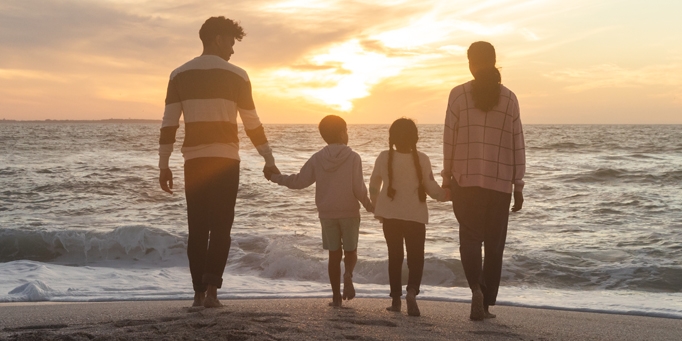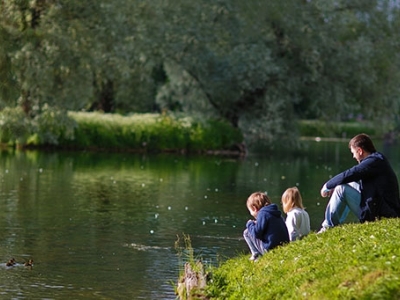
Five ways to improve mental health in your family (Part 1)
Christian psychologist Alexis Hudson explores some simple, proven strategies.
Family life can easily become filled with the busyness of day-to-day life. Packing lunchboxes, finishing homework, getting out the door for church, birthday parties, work, school … It can be hard to prioritise our mental health—we’re busy surviving, with little time left for thriving. I have had many clients and friends talk to me about how they want to be less stressed/worried/irritable or wanting to know how to foster things like resilience and empathy in their kids. I think a good starting point is trying to include or increase the practices championed by Positive Psychology.
When I first heard about Positive Psychology many years ago, my initial reaction was that it wasn’t for me. I wrongly assumed that it was advocating for a ‘just be positive’ or ‘happy thoughts only’ way of coping. These phrases have never sat well with me because at best, they’re a temporary distraction and at worst, they’re suggesting we shouldn’t feel bad about the hard things we go through.
The real base of Positive Psychology is not a ‘don’t worry, be happy’ approach. As its founder, Martin Seligman, explains, it’s about helping people to flourish. It’s not just about focussing on what cripples us and trying to get rid of it, but on what enhances life and how to build more of it. As a psychologist, I’ve introduced these practices to many of my clients. As a Christian, I’ve found that they match very closely with practices modelled in the Bible. As a parent, I’ve tried to include these as much as I can in our family life.
Nothing is ever a ‘silver bullet’ when it comes to addressing mental health, but I do believe these practical habits can be of real benefit. I see a lot of value in teaching these habits to our kids early on as part of setting them up to thrive.
Gratitude
Gratitude has become a bit trendy recently, although phrases such as ‘count your blessings’ have been around for a long time and from a Christian perspective, there is no shortage of examples of this practice in the Bible. What then has brought about the wider popularity of gratitude practices in our modern culture? It’s likely due to the growing body of research studies that have shown how beneficial the act of being thankful can be.
Practising gratitude has been shown to produce a raft of positive benefits such as improved mood, increases in optimism, resilience, generosity, helpfulness, better sleep and even improved immune function. What’s more, the research shows that these positive effects can happen in as little as two to four weeks and appear to strengthen over time. There aren’t many things that can promise such quick, yet lasting results. If there was a tablet claiming the same results, I’m sure it would be readily taken by many people! Gratitude, thankfully, is free and can be used effectively by kids and adults alike.
So how can gratitude be included within family life? It could be that this is already part of your daily routine, perhaps in giving thanks for your meal at dinner time or saying a prayer with your child at bedtime. These are great ways of including gratitude. Other ways could include going around the dinner table, each family member sharing three things they can say thank you for or encouraging your child/teen to write them down in a journal. If you want to go a step further, you and/or your family could choose to send a letter or card of gratitude to someone you know. This would have the lovely added outcome of boosting the receiver’s wellbeing as well as the sender’s. Building a culture of being grateful can also build a stronger sense of connection within your family, both now and well into the future.
It’s important to note that gratitude is not a way of disregarding the trials or challenges of life, but rather a way of us remembering and paying attention to the blessings in our lives, even in the midst of our struggles. Paul exhorts us to:
‘Rejoice always, pray continually, give thanks in all circumstances; for this is God’s will for you in Christ Jesus.’ (1 Thessalonians 5:18)
Awe/wonder
Awe is perhaps an experience that is difficult to put into words and so there have been some differing opinions on how to define it. One psychologist, Dacher Keltner, defines it as the ‘feeling of being in the presence of something vast that transcends your current understanding of the world’. It’s perhaps a realisation of how small you are in relation to something that is much grander, in a humbling sort of way.
Again, from a Christian experience, the concept of awe and wonder is not a foreign one. There are many references to it in the Bible. Similarly to gratitude, it has become an area of interest for more research into why it matters and the impact it has on mental health. Experiencing awe has been shown to facilitate a sense of meaning and purpose, increase empathy and generosity and reduce stress.
This might be something you’ve experienced on a personal level, but how can it become a more regular part of your family life? It is a bit trickier, given that feelings of awe and wonder can often happen spontaneously and rather personally, as in the case of a spiritual experience or an epiphany. However, there are also shared experiences and environments that can evoke awe and wonder.
Being in (and taking time to appreciate) creation fills us with awe—watching a glorious sunrise or sunset, looking up at majestic trees, watching a huge ocean swell crash into waves on the beach, looking up at the twinkling brilliance of a star-filled sky. We might also appreciate human creations by looking at a beautiful artwork or piece of architecture, or listening to a piece of music that gives you goosebumps.
My family and I were fortunate enough to travel through part of Australia a couple of years ago. Through this experience, we were able to share the wonder of creation in ways that we hadn’t before—swimming under waterfalls, taking in breathtaking views atop very high mountains, counting shooting stars. I learned that for our family, this was a way that we tend to experience awe together—being in creation and witnessing its scale and beauty. I appreciate that having dedicated time to do such a trip is a luxury and finding the time in everyday life is not easy. But trying to dedicate some time, even if it’s short, for these opportunities of awe is worthwhile.
David expresses the heart of awe in Psalm 8:
‘Lord, our Lord,
how majestic is your name in all the earth!
You have set your glory
in the heavens …
When I consider your heavens,
the work of your fingers,
the moon and the stars,
which you have set in place,
what is mankind that you are mindful of them,
human beings that you care for them? (Psalm 8:1–4)
We’ve looked at two simple habits or attitudes that are proven to improve mental health: gratitude and awe. Next time, we will consider three more habits that can help our families to thrive.
Recommended podcasts and videos:
The Happiness Lab (with Yale Professor Dr Laurie Santos)
The Science of Happiness (with Psychologist Dacher Keltner)
‘7 ways to be happier’ by Dr Laurie Santos
‘The new era of Positive Psychology’, TED talk by Martin Seligman
Recommended reading:
Authentic Happiness by Martin Seligman (Atria Books, 2004).
Flourish by Martin Seligman (William Heineman Australia, 2012).
‘A lesson in thanks’ by Jeffrey Froh, Greater Good Magazine
---
Alexis Hudson is a psychologist who has been working with adults and adolescents from all walks of life for just under 20 years. She loves empowering others to strive towards their best selves by helping them to develop skills and harness their strengths. She is a mum of three kids, and loves the way they bring out her adventurous side. Alexis and her family are part of a wonderful church community in the Sutherland Shire of Sydney.

Reap Journal
REAP stands for Read, Explore, Apply and Pray and is designed to make reading the Bible easy as a part of everyday life. There's a version for Adults, Youth and Kids, with similar daily passages across all versions (with special consideration for each demographic), meaning that families can learn together just as easy as individuals can.
For more articles from Growing Faith, subscribe to our monthly e-newsletter.
To hear about the latest books and resources from Youthworks Media, subscribe here.








